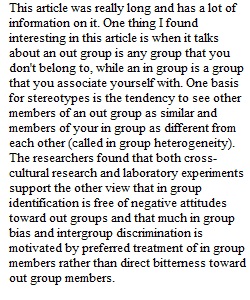


Q Prejudice is an attitude toward a group that leads people to evaluate members of that group negatively—even though they have never met them. On a cognitive level, prejudice is linked to expectations that members of the target group will behave poorly. On an emotional level, prejudice is associated with negative feelings such as fear, dislike, or hatred. In behavioral terms, prejudice is connected with avoidance, aggression, and discrimination. Discrimination refers to behavior that results from prejudice. One thing that contributes to discrimination is the extent to which people view themselves as members of a particular group, their "ingroup", and who they view as not being in their group, the "outgroup". Read the article: The Psychology of Prejudice: Ingroup Love or Outgroup Hate Download The Psychology of Prejudice: Ingroup Love or Outgroup Hate(Brewer, 1999). In a 250-300 word reply, explain the author's position and comment on at least two other student's replies in 75-100 words. Supplemental video:Prejudice and Discrimination: Crash Course Psychology #39 (Links to an external site.) Note: Click the options button in the upper right corner to see the rubric for this exercise.
View Related Questions